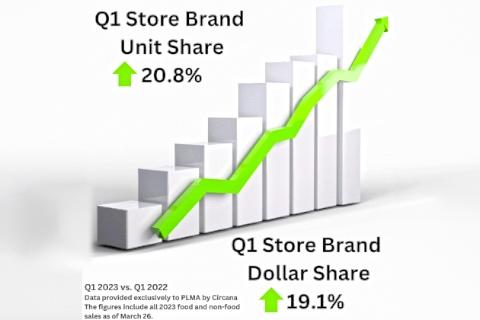Store Brand Sales Maintain Double-Digit Growth Rates

Store brands are still steaming along, as food prices remain elevated and the economic climate is uncertain. Consumers continued to add private label products to their baskets during the first quarter of 2023, according to an update from the Private Label Manufacturers Association (PLMA).
Using data from Circana (the new organization name for the recently-merged IRI and NPD), PLMA reported that store brand sales are maintaining double-digit growth rates and gaining market share in both dollars and units. During the first three months of this year, store brand dollar volume rose 10.3% on a year-over-year (YoY) basis, compared to 5.6% for branded products.
[Read more: "The Upside, Downside of Inflation on Grocers: Report"]
Some store brand categories are performing especially well. Store brand beverages were up 17.1% in dollar sales during Q1, while bakery items rose 16.8%, refrigerated products increased 15.5%, floral goods climbed 13.1% and general food notched a 16% gain. Other categories also fared well during the early months of the year, including deli cheese (+9%), frozen foods (+7.1%), produce (+6.8%), deli meat (+5.8%) and liquor (+5.8%). Meat was the only food category that lost private label sales, down 1.6% for the quarter.
In nonfoods, store brand health care products ticked up 10% in sales during the same time frame, while general merchandise came in 8.8% higher and beauty products rose 7.4%. Dollar sales of store brand tobacco products were down 11.8%.
Unit sales continued an overall trend of decline, but the pace was decidedly slower in private label. According to Circana’s data, store brand units decreased 1% during the first quarter of 2023 versus a 3.9% dip for national brands. The gap widened in March, as unit sales of store brands slipped 0.7%, while unit sales of branded items dropped 3.5%.
Information gleaned during the first quarter also underscores the penetration of private label in the retail marketplace. Circana’s research shows that the dollar share of store brands grew to 19.1% during the first quarter, up from 18.5% during the first quarter of 2022. Unit share also went up to 20.8% compared to 20.3% on a YoY basis.
Peggy Davis, president of PLMA, said the findings show that consumers continue to adjust their buying behaviors and seek both value and quality in store brands. “The Q1 results are particularly impressive since they are compared to 2022 sales figures, which were historically high for U.S. store brands,” she noted.
This is the latest report affirming the popularity of private brands in a wobbly economy. A new study from Coresight Research showed that store brands accounted for 18.2% of total U.S. food and beverage sales as of Feb. 19, 2023, with strong growth across several categories. Earlier this year, research from Attest revealed that 58% of U.S. consumers are “very likely” to purchase store brands, while 27.3% report that they are “somewhat likely” to buy those products and only 4% are “unlikely” to do so.







